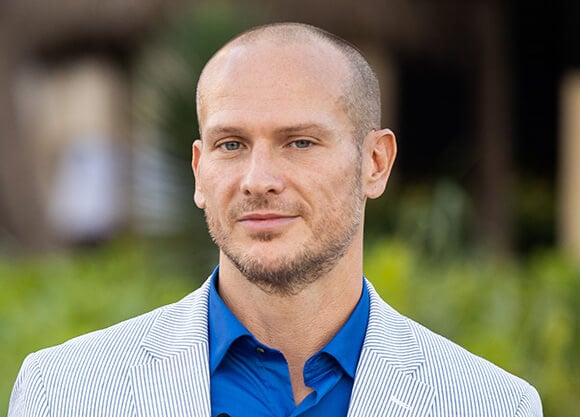
Director of community programming appointed to state working group to help reshape AI landscape
September 06, 2023

September 06, 2023

“Momma ain’t raise no fool,” in DesRoches’ words. This motto led him through his amazing accomplishments, and to his most recent appointment to the state’s artificial intelligence working group.
DesRoches’ love for storytelling began after graduating college in 2003 when he and a friend started a nonprofit media organization in Ethiopia. Their goal was to travel the world and tell people’s stories.
DesRoches, director of community programming at Quinnipiac, eventually moved to Connecticut where he jumped into journalism, uncovering a special education debacle within the public school system that ended up making national headlines. His work produced real change at the state level.
“It was at that point that I saw how important true journalism can be – it's at its best when it's holding powerful people to account and looking out for the most vulnerable and marginalized in our society,” DesRoches said.
Because of his work, DesRoches received prestigious accolades, including “reporter of the year” by the New England Newspaper and Press Association twice — in 2013 and 2014 — and made Connecticut Magazine’s “40 Under 40” list in 2015.
“To this day, I remain committed to standing up for those who don’t have a voice; it’s part of my interest in working with Ability Media, a student-based news outlet at Quinnipiac that covers issues related to people with different abilities. Most of my motivation to look out for vulnerable populations is rooted in my upbringing,” DesRoches said.
Eventually, DesRoches’ work introduced him to artificial intelligence.
DesRoches was hired by a film company to report and produce “Forecasting Abuse,” a podcast pilot episode for a Sundance Institute-funded podcast called “America Decoded.”
Through this work, DesRoches produced an in-depth look at predictive algorithms through looking at data and interviewing families. When it came to using predictive analytics in child welfare cases, things had the chance to go south quickly.
“Through that work, I read a lot about predictive algorithms,” DesRoches said. “They are used in all aspects of society, from your Google searches to your Instagram feed, and even in our interactions with the legal system. There are so many problems with this technology, because the mathematical formulas are created by people, and the data that gets fed into these formulas also comes from people. And as we all know, people are flawed, at best. At worst, people can be bigoted, racist, or sexist, or all of the above.”
In addition, he learned all about artificial intelligence and how predictive algorithms can learn and adapt through what they are programmed to do.
“I don’t think AI is good or bad. It’s probably both,” DesRoches said. “We are at a critical point in human history, unlike any other before. We are on the verge of creating machines that can do more than we can. Theoretically, machines will be able to cure diseases, or develop portable quantum computers, or even propulsion systems that defy gravity. The possibilities are endless and exciting. However, at the same time, we should remain vigilant and hyperaware of all the different ways this tech can go awry, especially when it comes to marginalized communities.”
DesRoches continued working on the “America Decoded” podcast after coming to Quinnipiac in 2019. Reporting on the story introduced him to a wide range of research surrounding predictive analysis, machine learning, and artificial intelligence.
At the time, DesRoches was a volunteer for the Connecticut Foundation for Open Government (CFOG) where he began exploring the importance of transparency around the use of algorithms by public agencies.
This included work with Yale Media Freedom and Information Access Clinic (MFIA), where he was invited to testify to the U.S. Commission on Civil Rights State Advisory Committee on the impact of algorithms on civil rights in Connecticut.
DesRoches was recently appointed to the state legislature’s artificial intelligence working group by Senator Duff, who he had been friendly with for over a decade through his journalism work.
The Working Group was set up as part of Public Act 23-16: An act concerning artificial intelligence, automated decision-making and personal data privacy.
“The law does a number of things, including the requirement that the Department of Administrative Services conduct an inventory of all AI used by public agencies in the state, as well as provide an assessment of the systems to ensure that no unlawful discrimination is taking place,” DesRoches explained.
In Connecticut State Sen. Bob Duff’s appointment letter to DesRoches, he wrote, “I am confident that the knowledge and experience you bring to this position will be of great value to the board,” speaking to DesRoches’ past work and experience in the field of artificial intelligence.
DesRoches plans to carry his curiosity and knowledge into his work here at Quinnipiac. Especially as the university works toward becoming a leader in AI, DesRoches hopes to best understand implementation methods.
“When it comes to education, AI employed appropriately is going to open innumerable doors of opportunity for creative expression, innovation, and deep learning,” DesRoches said.
Quinnipiac Today is your source for what's happening throughout #BobcatNation. Sign up for our weekly email newsletter to be among the first to know about news, events and members of our Bobcat family who are making a positive difference in our world.
Sign Up Now